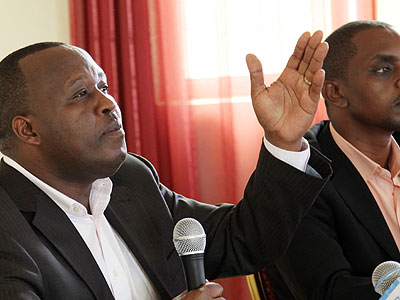Failure to streamline the screening of Genocide survivors who qualify for assistance and lack of clear mechanisms to monitor activities of Genocide Survivors Support and Assistance Fund (FARG) has cost the country billions of francs.


Failure to streamline the screening of Genocide survivors who qualify for assistance and lack of clear mechanisms to monitor activities of Genocide Survivors Support and Assistance Fund (FARG) has cost the country billions of francs.
This was disclosed on Wednesday by Theophile Ruberangeyo, the FARG Executive Secretary, while addressing the issue of mismanagement highlighted in the 2012-2013 Ombudsman report. He said they had adopted a decentralised approach to rectify the errors.
"In the past, the screening was carried out by FARG representatives at the local level and associations of Genocide survivors. During the time, there were clear issues of abuse,” said Ruberangeyo, adding that a total of 17,000 students were supported yet they did not merit the support.
FARG has since 1998 spent about Rwf170 billion on education, health and shelter.
Education took 70 per cent of FARG’s Rwf113 billion budget where 21,141 and 16,539 students in secondary and university, respectively, were supported.
The Ombudsman’s report, presented to Parliament on November 13, last year, indicated gross mismanagement of FARG funds between 1998 and 2012.
According to the report, of the 137 projects that received financing, only 22 of them were still operational. Over Rwf300 million was misappropriated.
The most critical challenge facing FARG is lack of shelter for beneficiaries. The issue even raised controversy at Parliament last week after the Minister of State for Social Affairs, Alivera Mukabaramba, presented figures that differed with those in the Ombudsman’s report.
FARG accounts show 38,657 housing units that were built but the Ombudsman says the number is lower.
Most of the houses are in a sorry state with 12,000 units in need of renovation while over 4,000 need total reconstruction, a situation that Ruberangeyo blames on dishonest contractors.
He said a total of 22 cases involving contractors who did shoddy work were in court. Ruberangeyo said FARG has so far won one case, worth Rwf35 million, and lost another of a similar amount.
In order to weed out abuse, Ruberangeyo said they had enlisted the services of the Reserve Force to construct houses worth Rwf4 million and Rwf10 million each.
Other reforms embarked on since May 2013 include revising mechanisms for identifying beneficiaries.
"We now have a screening committee made up of police and army, associations of Genocide survivors, the Commission to Fight against the Genocide (CNLG), FARG, as well as district and sector leaders,” he said.
Ruberangeyo added that money will no longer go directly from FARG to the beneficiaries, but will now be incorporated in district budgets for accountability purposes.
"Our role remains oversight and coordination. The programmes will be implemented through the district budget,” he said.
The new reforms were welcomed by Ibuka, the umbrella organisation of Genocide survivors’ associations.
"We are happy that past errors are being rectified to ensure continuity of the programme,” said Jean Pierre Dusingizemungu, IBUKA president.


